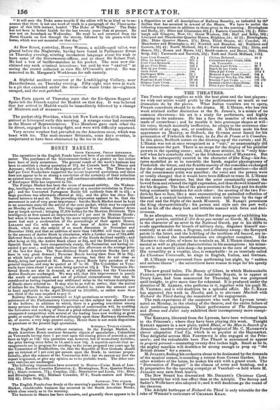THE THEATRES.
THE French stage supplies us with the best plots and the best players : we wish our actors would profit by the performances as much as our dramatists do by the pieces. What Italian vocalists are to opera, French comedians should be to the drama. M. L'IlEam, who has this week attained stellar distinction at the St. James's, is a mimic of no common cleverness : his art is a study for performers, and highly amusing to the audience. He has a face the muscles of which seem made of caoutchouc ; and he moulds it into grotesque shapes at will : his voice, though musically ineffective, he adapts to the utterance cha- racteristic of any age, sex, or condition. M. L'IliatiE made his first appearance on Monday, as Stolbach, the German actor famed for his personation of Frederick the Great, in Le Roi de Prusse et It Comedien. In this piece, Stolbach enters on the drawing-up of the curtain ; and M. L'DERIE was not at once recognized as a "star," so unassumingly did he commence the part. There is no scope for the display of his peculiar powers in the opening scene ; and, like most mimics, he is "only him- self when he's somebody else," as the Irishman said of MATHEWS. But when he subsequently entered in the character of !the King—his fea- tures modelled so as to resemble the harsh, angular physiognomy of Frederick the Great, and the flexible suavity of the comedian exchanged for the abrupt and peremptory manner of the royal martinet—the skill of the consummate artist was manifest: the voice and the person were so totally changed that it would have been difficult to trace M. L'HEare in the assumed character, but that the actor occasionally unbent the bowed form and relaxed the rigid expression, and thus showed himself un- der his disguise. The fun of the piece consists in the King and his double being constantly mistaken for each other : the meeting of the two Fre- dericks face to face like a man encountering an embodied reflection of himself, is a comical incident, rendered more ludicrous by the rage of the real and the fright of the mock Monarch. M. BARQIII personates the King characteristically : his person and style suit the part well; and he hit off the sharp look and irritable manner with force and deci- siveness.
In an afterpiece, written by himself for the purpose of exhibiting his peculiar powers, entitledL'Art de ne pas monter sa Garde, M. L'HzstrE, in the character of an actor in the National Guard, put to his shifts to evade apprehension for breach of military duty, disguises himself suc- cessively as an old man, a Negress, and a chimney-sweep : the Savoyard patois in the latter, and the babbling of the toothless old bavard, are in- imitable ; indeed the transformations are altogether complete. Like MATHEWS the elder, of whom he reminds us, M. L'DERTE simulates the mental as well as physical characteristics in his assumptions : his mime- tic art is not merely skin-deep—he penetrates to the core of character. His versatility as a vocalist, also, is remarkable : in an interlude called La Chanteuse Universelle, he sings in English, Italian, and German.
M. L'HEem was prevented from performing last night, by "sudden and serious illness " : the subscribers have reason to hope for his speedy recovery.
The new grand ballet, The Beauty of Ghent, in which Mademoiselle FLEURY; premiere danseuse of the Academic Royale, is to appear at Drury Lane, had been announced for Thursday, but was postponed until tonight, to give more time for rehearsal. It is produced under the direction of M. ALBERT, who performs in it, together with his pupil M. H. VESTBIS ; and it will doubtless be a splendid affair. Mr. C. KEAN has appeared this week in Hamlet, and is to alternate Macbeth with Richard the Third during the remainder of his engagement.
The rash experiment of the amateurs who took the Lyceum termi- nated on Monday, in the closing of the theatre, and the entire failure of their ambitious aspirations. Their performance of The Honeymoon and Romeo and Juliet only exhibited their incompetency more conspi- cuously.
The KEELEYS; liberated from the Lyceum, have been welcomed back to the Princess's ; where they have been playing this week. Tonight KEELEY appears in a new piece called Blasé, or the Man in Search of a Sensation ; another version of the French original of Mr. C. MATHEWS'S clever adaptation Used Up, which is so popular at the Haymarket. That delightful actress Miss FORTESCUE is also engaged at the Prin- cess's; and the redoubtable hero Tom Thumb is announced to appear in propria persona—measuring twenty-five inches high. Small as he is, the mighty manikin will doubtless be strong enough to prop up "the British drama" for a season.
M. Juu.roir,finding his orchestra about to be decimated by the demands of the musical season, is sounding a retreat from Covent Garden. Like other wielders of the baton, he makes his exit with a grand crash. The "Destruction of Pompeii" is the climax of noise and humbug, and a fit preparative for the opening campaign at Vauxhall—a field where M. JULLIEN may earn fresh laurels.
The New Strand has dramatized Mr. DICKENS'S Christmas Carol, more literally bat with less effect than at the Adelphi. The Surrey and Sadler's Wells have also adopted it; and it will doubtless go the round of the theatres.
The Adelpbi burlesque of Richard the Third is only tolerable for the sake of Walcar's caricature of CHARLES KEAN.


























 Previous page
Previous page